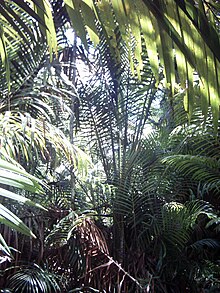Sago



Sago /ˈseɪɡoʊ/ is a starch that comes from the spongy centre of tropical palm stems. In many cases, it comes from Metroxylon sagu. It is a major staple food for many people living in New Guinea and the Moluccas. It is called saksak, rabia, and sagu in those areas.
The largest suppliers are usually in Southeast Asia, particularly Indonesia and Malaysia. Big quantities of sago are often sent to Europe and North America for cooking purposes.
Cooking
[change | change source]It is traditionally cooked and eaten in various forms. It can be rolled into balls by boiling it in hot water. It forms a glue-like paste (papeda), or as a pancake.
Sago is often sold in the form of "pearls". These small rounded starch become gelatinized by heating. Sago pearls can be boiled with water or milk and sugar to make a sweet sago pudding.[1] Sago pearls look similar to other pearled starches like pearls made out of cassava starch (tapioca) and potato starch. They may be used interchangeably in some dishes or snacks.
References
[change | change source]- ↑ "Sago Pudding with Palm Sugar (Sago Gula Melaka)". mycookinghut.com. Archived from the original on 30 March 2022. Retrieved 9 March 2011.
